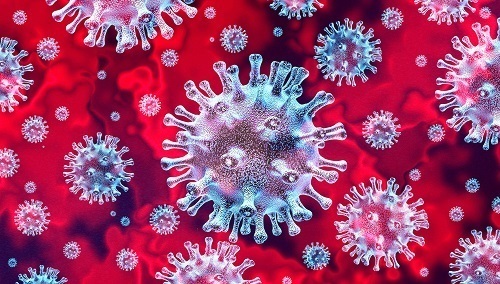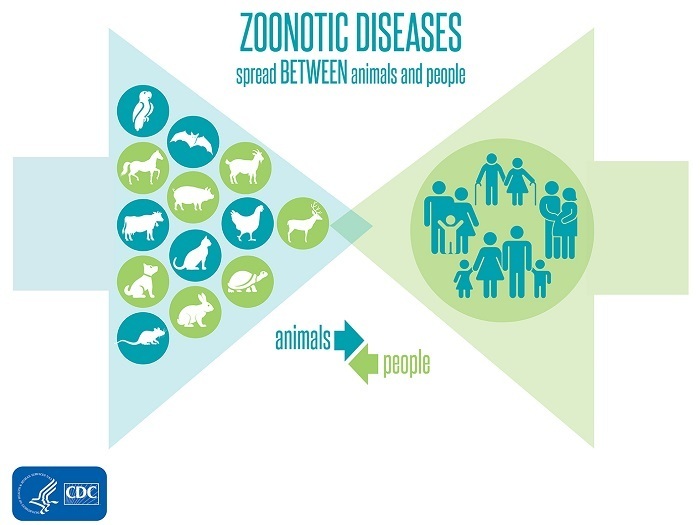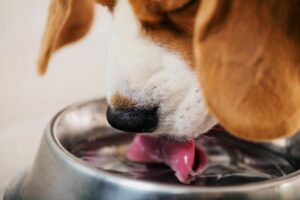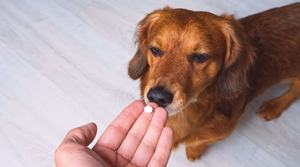People have a lot of questions about the virus that has now been classified a global pandemic, the novel coronavirus or COVID19 as it is more commonly being referred to.
As the disease spreads and evolves some of these questions are being answered, while others may only be solved over time as experts and researchers learn more, and experience will play a large part too.
A common question pet parents have is can dogs get corona virus?
While there are very few ways - aside from the very important steps of hand washing and social distancing as well as self-isolation for the possibly infected - to prevent humans getting the disease the fact that they are not even sure if their furry friends can contract COVID-19 is adding to the confusion and stress many people are feeling right now.
Here we are going to take a closer look at the question can dogs get coronavirus and some of the answers that experts have for us so far.
Animals and Coronaviruses

Coronavirus illustration
One of the things that perhaps the media is to blame for confusing is that some people don't understand that the term coronavirus refers to a set of viruses, not just the COVID19 that is causing so many problems right now. And some of those viruses, have, in the past, been viruses that could affect dogs (and cats).
Thus far, despite a single case in Hong Kong that has now been deemed a 'false positive', according to the World Health Organization (WHO) in a statement on their website:
While there has been one instance of a dog being infected in Hong Kong, to date, there is no evidence that a dog, cat or any pet can transmit COVID-19. COVID-19 is mainly spread through droplets produced when an infected person coughs, sneezes, or speaks. To protect yourself, clean your hands frequently and thoroughly.
Christie Long, DVM, head of veterinary medicine at Modern Animal had this to say about the infected Pomeranian dog in Hong Kong.
Since the dog lives with a COVID-19 patient, the potential is significant for the positive test to have come as a result of the dog picking up the virus from the environment with its nose.
On the 18th March, the 17-year-old Pomeranian with the confirmed coronavirus infection was reported to have died — but we don't know if it was due to the virus since he didn't develop symptoms of illness while infected, and had been allowed to return home after finally testing negative for the virus.
The owner has not allowed the dog to be autopsied, so the exact cause of death remains unknown.
It should be noted, however, that very little about COVID19 can be considered a guarantee right now.
Many authorities – including the University of Illinois at Urbana-Champaign’s College of Veterinary Medicine – characterize the possibility as “very unlikely" that dogs can suffer from COVID-19.
However, the latest advice is that anyone diagnosed with the virus should not hug or kiss their pet, just in case.
This does not mean, however, that as a healthy pet parent you can ignore it completely.
Another thing that many people do not realize is that there are diseases that exist that can be transmitted from pups to humans, and as you will likely be spending a lot more time in close quarters with your pup than usual, there are still some extra precautions to be taken as you all 'shelter in place' together.
Understanding Zoonotic Diseases

Zoonotic diseases are caused by germs that spread between animals and people. (Source: CDC.gov)
Diseases that spread to humans from animals, including domestic dogs, are known scientifically as zoonotic diseases.
These are more common than you might think!
According to the CDC 6 out of 10 of the known infectious diseases people can get (this does not include the current COVID-19 infection) can be spread from animals to humans.
According to the CDC, these groups of people are at a higher risk of serious illness from zoonotic diseases:
The way these diseases are spread include from feces and often used utensils like food and water bowls. These risks have always been around and are usually not thought about that often.
But with the arrival of a global pandemic people are being forced to think about a lot of things they have not in the past, including improving household hygiene habits in a home that includes humans and dogs.
Everyday Hygiene in a Pet Friendly Home
All the materials and videos you've been seeing recently about the importance of washing your hands frequently - and for a longer period of time, is common sense stuff that should really never have needed repeating so much.
But now everyone is getting used to the idea, it's very important that it not be forgotten, even when the current situation changes.
Health experts and vets have long recommended that you - and others, especially children, older people and those with compromised immune systems - should wash your hands after playing with your pup, and before and after handling his food and water bowls.
You should also try to ensure that young kids don't put their hands in their mouth after petting their pup before they've washed them.
To protect your pup from germs and bacteria, and a possible spread of Zoonotic diseases like salmonella or E. coli, ensure that his food and water bowls are washed regularly and that any that are worn or stained are replaced. You should also keep his bedding as well laundered as you keep your own.
Supplies That Can Help
Another one of the ways you can help protect yourself, your family and your pup is by ensuring that you have hand and paw sanitizer on hand for trips outdoors when you might be away from water.
You can buy a number of different types of paw sanitizing wipes, which are great for cleanups and for keeping puppy paws healthier in general, or you can even purchase portable paw cleaners, which are cylindrical devices that work a lot like those big pots of nail polish remover for humans do!
Another layer of protection are booties which can also provide hot and cold weather protection.
For yourself your regular hand sanitizer of choice is just fine.
If you're concerned about your pet dog bringing in something nasty inside the house, even traces of COVID-19, The American Kennel Club notes that you can wipe their paws with paw wipes once you return indoors.
Key Takeaway
There's no doubt that these are scary and confusing times.
Great hygiene is key though, especially in a pet friendly home that includes humans and pups, and with common sense and a little more vigilance you and your family, both human and fur, will be as well protected from coronavirus as possible as you enjoy this unexpected extra time together at home.



